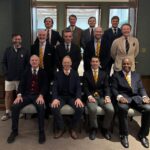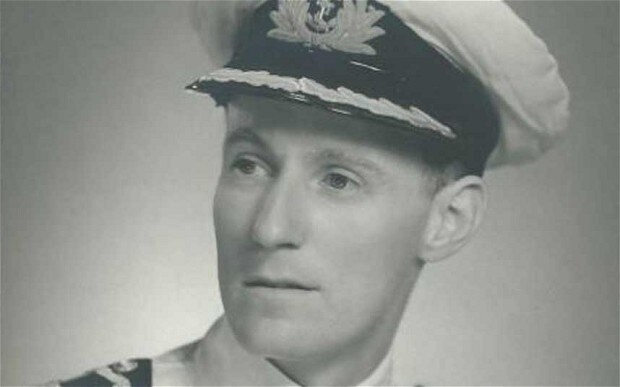The Haileybury Society is saddened to learn of the death of Commander Ronald Stewart Borner, OBE, VRD, RN (C 26), who has died on March 2nd 2014, aged 101.
Ronald was born in India and christened in Bombay Cathedral. Educated initially at Abbey School, Beckenham, he then moved to Haileybury, where he excelled at cricket and played in the 1930 XI. He was mentioned in Wisden for his performance in a 1930 match against Cheltenham and was selected for the Kent young amateurs’ XI.
Crossed-wires in Greece
While following a career in accountancy, Ronald also worked in the London Division RNVR as a paymaster sub–lieutenant in 1934 and was mobilised in August 1939.
Despatched via Alexandria to Greece and travelling in plain clothes under cover as a vice consul, he surveyed the harbours, but was mortified to discover that his painstakingly ciphered reports could not be understood by the Admiralty. Eventually he sent a hard copy en clair via the embassy’s diplomatic bag, before returning by train from Brindisi to London. There it was discovered that the codes he had been given were six months out of date.
Operation ‘Royal Marine’
In January 1940 Borner joined a naval expeditionary force codenamed Operation Royal Marine; yet though the officers and men adopted khaki uniforms there were no Royal Marines involved. After trials with dummy mines in the Thames, the force was sent to Western France with several trucks of explosives. Their task – under the overall command of Rear–Admiral John Fitzgerald – was to disrupt river traffic and to destroy bridges by launching floating and bouncing mines into rivers.
For several months during the Phoney War, French forces refused to allow the men of Royal Marine to proceed in earnest. After May 10, however, as France faced the German Blitzkrieg, Borner and his comrades launched more than 2,300 mines into the Rhine, Moselle and Meuse rivers.
Operation Royal Marine was one of a number of schemes devised by Winston Churchill (at that time First Lord of the Admiralty) which were intended to take the war to the enemy. Churchill took particular pleasure in presenting his cabinet with photographs showing that the barrage on the Rhine had been broken by fluvial mines, and that river traffic had been completely stopped between Karlsruhe and Mainz.
When, in early June, the French suggested that Admiral Fitzgerald’s party should be withdrawn, the British Prime Minister personally drafted a telegram which he read to the War Cabinet, pointing out “the success which had attended this manoeuvre and strongly urging that yet further operations of this nature should be undertaken”.
Desperate actions
Meanwhile in France, often with no one between them and the advancing Germans, Borner and his sailors engaged low–flying aircraft with spirited rifle fire, hunted German paratroops, and turned surplus mines into improvised anti–tank traps.
Borner retreated to Paris with orders to launch his remaining mines into the Seine to destroy temporary bridges which the Germans were building lower down the river, and when Paris was declared an open city he withdrew to Le Mans. There he was given a truck and a party of sailors and told to make his own way to the coast. At St Malo they commandeered the Duke of Westminster’s private yacht and steamed to Southampton.
French warships after Dunkirk
In July 1940 John Fitzgerald, who had been naval attaché in Paris, was given the title Rear Admiral (French Ships) and in the early hours of July 3 Borner helped him to take over those French warships which, after the fall of France, had taken refuge in Portsmouth.
Subsequently Ronald helped train gunners for the Merchant Navy, and then to the staff of the Director General Shipbuilding and Repairs (India) in Bombay where he met his future wife, Margaret.
Post-war career
Ronald hed joined accountants Peat Marwick Mitchell in 1936 but found, on his return after the war, that many juniors who stayed behind had been promoted over him. He subsequently became bursar of Taunton School before being appointed successively chief executive of the Chartered Land Agents’ Society and the Chartered Auctioneers’ and Estate Agents’ Institute.
Ronald was appointed OBE for his services to agriculture in 1957. Following a stint as director of administration for Savills, he continued to work as a consultant until 1982. In retirement he also served as Vice–President (1985–95) of the Royal Star & Garter Home.
He was also a liveryman of the Worshipful Company of Farmers and, in 1972–73, its Master. In 1987 he helped it to become the first company for nearly two centuries to acquire a livery hall.
Ronald’s wife predeceased him in 2000, followed two years later by his son John, also Master of the Worshipful Company of Farmers.
More from The Haileybury Society
- £500 Travel Grant Awarded for Clinical Placement in Peru – Emily Jacobs (M13)

- World Champions & OHs Take to the Court at Queen’s

- Design, Politics and Discovery: A Solo Journey Across Europe

- Running for Mark: Barcelona Marathon Fundraiser

- Haileybury Society Bangkok Reunion

- SAVE THE DATE – concert by the Gents of St John’s College

Unless otherwise stated, all content and images on this website and blog © The Haileybury Society, 2024, all rights reserved
Search stories by date
| M | T | W | T | F | S | S |
|---|---|---|---|---|---|---|
| 1 | 2 | |||||
| 3 | 4 | 5 | 6 | 7 | 8 | 9 |
| 10 | 11 | 12 | 13 | 14 | 15 | 16 |
| 17 | 18 | 19 | 20 | 21 | 22 | 23 |
| 24 | 25 | 26 | 27 | 28 | 29 | 30 |
| 31 | ||||||
Unless otherwise stated, all content and images on this website and blog © The Haileybury Society, 2024, all rights reserved
